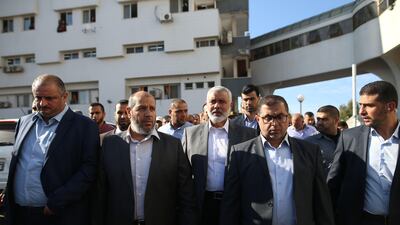The head of Hamas security forces in the Gaza Strip was injured on Friday when his car exploded in what the Hamas interior ministry called "a failed assassination attempt".
"Tawfiq Abu Naim, director general of the internal security forces, survived a failed assassination attempt Friday after his car was blown up in the Nusseirat refugee camp," the ministry said.
"He was moderately wounded and was treated in hospital," it said. "The security services immediately began investigations to discover the circumstances of the incident and to catch the perpetrators."
The incident comes at a time of tension within Gaza as Hamas prepares to start handing over power to the West Bank-based Palestinian Authority (PA) of Fatah leader and Palestinian president Mahmoud Abbas.
Hamas, which has been quick to blame Israel for similar attacks in the past, did not say who it believed was behind the bombing, suggesting it could also be the work of a radical Salafi group that opposes the Palestinian rapprochement.
Israel's military refused to comment on the bombing.
Hamas has stepped up a security campaign against Salafi groups and recently detained a senior operative. Hamas also has improved ties with Egypt, which is battling extremist groups across the border in the Sinai peninsula.
_________________
Read more:
Hamas deputy leader says to continue Iran ties, armed fight
Hamas says unity deal at risk if Abbas does not end sanctions
‘We were wrong to boycott Hamas', says Tony Blair
_________________
Egypt played a major role in mediating the unity deal signed this month that aims to ending the decade-long split between Hamas and Fatah.
The PA is due to resume control of the Gaza Strip by December 1 under the deal.
However, previous such attempts at reconciliation have repeatedly failed. Senior Fatah officials travelled to Gaza this week to take control of two government offices there, but they turned back, saying Hamas officials rejected their authority. A Fatah spokesman later said the issue was being resolved.
A major sticking point in the latest deal is expected to be Hamas's refusal to disarm its 25,000-strong armed wing.
Hamas seized Gaza in 2007 in a near civil war with Fatah that followed an electoral dispute after polls won by the Islamist movement.
After Hamas's victory, it faced demands from the international community that it renounce violence and recognise Israel, which it refused to do.
Hamas has faced increasing isolation and deteriorating humanitarian conditions in the Gaza Strip in recent months, including a severe electricity shortage.

